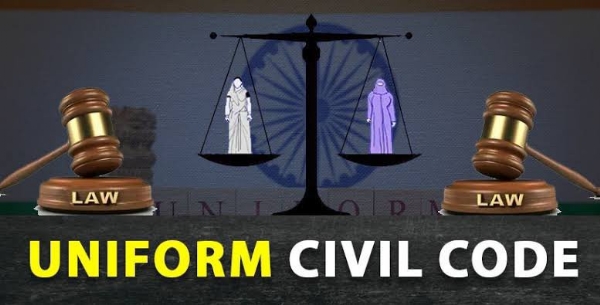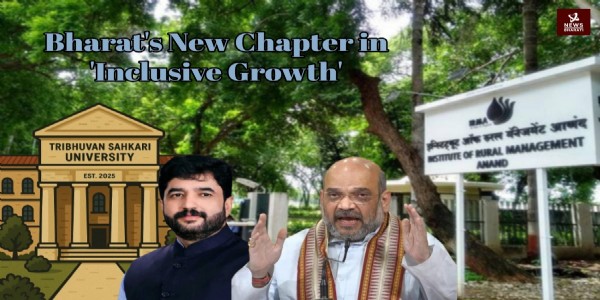NB Explains | Modi Govt's major step towards Uniform Civil Code; Law Panel seeks views in next 30 days
Total Views | 100
New Delhi, June 15: In a fresh development on Uniform Civil Code, the Law Commission of India on Wednesday set about to examine the issue afresh as it solicited views and suggestions on UCC from the public and recognized religious organisations.
A notice issued by the Commission said those interested and willing may present their views within 30 days.

Law Panel seeks views on UCC
It said the 21st Law Commission had initially examined the subject of UCC and solicited the views of all stakeholders on October 7, 2016 with further public appeals/notices on March 19, March 27 and April 10, 2018. After an overwhelming response, the 21st Law Commission, it said, came out with a consultation paper on ‘Reforms of Family Law’ on August 31, 2018.
Since more than three years have been lapsed from the date of issuance of the said Consultation Paper, bearing in mind the relevance and importance of the subject and also the various Court orders on the subject, the 22nd Law Commission of India considered it expedient to deliberate afresh over the subject.
Accordingly, the 22nd Law Commission of India decided again to solicit views and ideas of the public at large and recognized religious organizations about the Uniform Civil Code. Those who are interested and willing may present their views within a period of 30 days.
Uniform Civil Code
A Uniform Civil Code essentially means a common set of laws governing personal matters such as marriage, divorce, adoption, inheritance and succession for all citizens of the country, irrespective of religion. Currently, different laws regulate these aspects for adherents of different religions for e.g Sharia Law is still practiced across country and a Uniform Civil Code is meant to do away with these inconsistent personal laws.
The need for Uniform Civil Code
Currently, issues like marriage, divorce and inheritance are governed by personal laws of one’s religion. As these are widely divergent, there is no consistency in the treatment of these issues for people belonging to different communities, and women have often been at a disadvantage.
Reforms to personal laws have been inconsistent, with multiple amendments brought to Hindu personal laws (which have been enacted), while Muslim law has seen fewer changes – though the Supreme Court’s Triple Talaq judgment could lead to a number of Muslim personal law practices being similarly struck down. A UCC could lead to consistency and gender equality when it comes to personal laws, and usher in some much needed reforms.
Notably, Article 44 of the Constitution, which is one of the Directive Principles of State Policy, lays down that the State shall endeavour to secure for the citizens a uniform civil code throughout the territory of India. However, directive principles, as Article 37 clarifies, are not enforceable by courts.
When we look at the a case like Shah Bano Case of 1985 that dealt with welfare for Muslim women, the Supreme Court called it a "matter of regret that Article 44 has remained a dead letter", adding common civil code will help the cause of national integration by removing desperate loyalties to laws that have conflicting ideologies.
Govt calls UCC-less country means an “affront to the nation’s unity"
In March, the top court gave judgemeny on petitions demanding for UCC observing that such issues are meant for Parliament to decide and that courts should not be seen as directing the legislature to enact a law. “Entertaining these petitions would mean directing the enactment of law and a mandamus (command) cannot be issued to Parliament to enact a law,” said a bench led by Chief Justice of India DY Chandrachud.
Responding to these petitions through an affidavit in October 2022, the Union government had told the court that personal laws based on religion is an “affront to the nation’s unity”, adding UCC will bring about integration of India by bringing different communities on a common platform through an unvarying legal regime.
UCC, one of the key promises of BJP-led by PM Narendra Modi
In 2019, the BJP has reiterated its stand to draft a Uniform Civil Code citing Article 44 of the Constitution, under which drafting a UCC as a Directive Principle of State Policy, as well as gender equality as the reasons behind why a UCC should be drafted. It claims their UCC will protect the rights of all women, “drawing upon the best traditions and harmonizing them with the modern times.”
The BJP has made this promise in every manifesto since 1998 but failed to take any action when in power, including when it had a strong mandate in 2014. If they do try to make it happen, minorities are likely to raise concerns that laws are being passed without any regard for their rights.
Bharati Web
Mes, Pune







